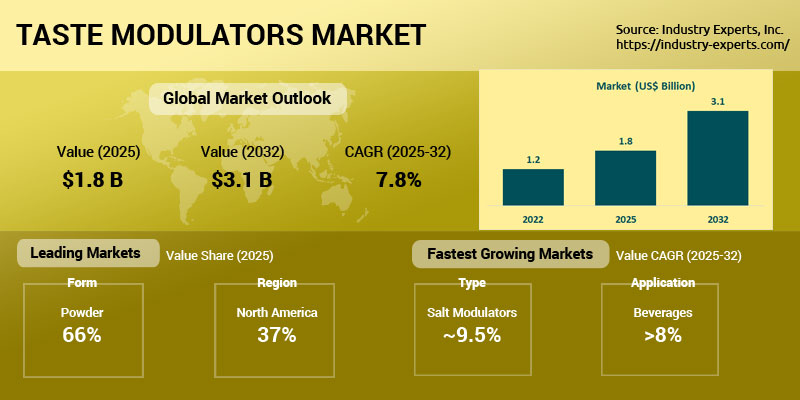Global Taste Modulators Market to Exceed US$3.1 Billion by 2032, Driven by Sugar & Salt Reduction, Plant-Based Diets, and Healthier Food Innovations
Industry Experts, Inc. has introduced the new market research report, "Global Taste Modulators Market - Types, Sources, Forms and Applications." The study projects the global taste modulators market to advance from US$1.8 billion in 2025 to US$3.1 billion by 2032, growing at a CAGR of 7.8% between 2025 and 2032. Rising consumer awareness of lifestyle-related diseases, government-driven sodium and sugar reduction mandates, and rapid growth in functional and plant-based foods are fueling strong demand for taste modulators that enable healthier formulations without compromising flavor.
The report highlights North America as the largest market, capturing 37.1% share in 2025, supported by high prevalence of obesity and diabetes, strong regulatory pressure on sugar and sodium reduction, and robust R&D investments by leading food and beverage companies. The U.S. and Canada are key markets, where consumers show strong willingness to pay premiums for healthier products. On the other hand, the Asia-Pacific region is expected to post the fastest growth, at 10.2% CAGR during 2025–2032, driven by rising middle-class incomes, urbanization, and growing health awareness. Expanding adoption of plant-based diets, government nutrition programs, and rapid penetration of reformulated low-sugar and low-fat foods in China and India are further boosting demand across the region.

By type, sweet modulators dominate in 2025, benefiting from their critical role in sugar reduction initiatives for beverages, desserts, and processed foods. Innovations in natural modulators such as stevia and monk fruit are reinforcing demand as consumers prefer clean-label and natural alternatives. Meanwhile, salt modulators are forecast to grow the fastest, at 9.5% CAGR, supported by global sodium reduction campaigns and regulatory frameworks from the FDA and WHO. By source, natural modulators account for largest share in 2025 and will also grow the quickest at 9% CAGR, as plant-based, organic, and clean-label trends continue to expand. From an application standpoint, beverages represent the largest and fastest-growing segment, at 8.7% CAGR, driven by surging demand for low-calorie soft drinks, flavored waters, functional drinks, and alcohol alternatives.
The report segments the global taste modulators market by type (fat, salt, sweet, and others), source (natural and synthetic), form (liquid and powder), and application (beverages, foods, pharmaceuticals, and others). Geographic scope spans five major global regions with detailed coverage across 20+ countries. The study profiles more than 20 leading companies, including Ajinomoto, ADM, Cargill, Dohler, dsm-firmenich, Givaudan, Ingredion, IFF, Kerry Group, Sensient Technologies, Symrise, Tate & Lyle, and Takasago.
For sample pages or purchase options, contact +1-320-497-3787 or visit Taste Modulators Market Report.
About Industry Experts, Inc.
Industry Experts, Inc., ranks among the leading market research providers globally. The company's off-the-shelf and customized business intelligence reports offer strategic insights and valuable guidance to enable various stakeholders - corporate strategists, analysts, researchers, and startups, among others - in obtaining unbiased current and future market data. For more information, contact us on +1-320-497-3787 or visit https://industry-experts.com.



Comments
Post a Comment